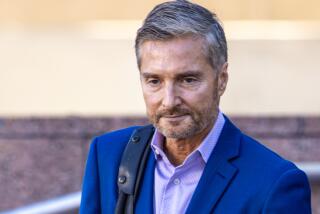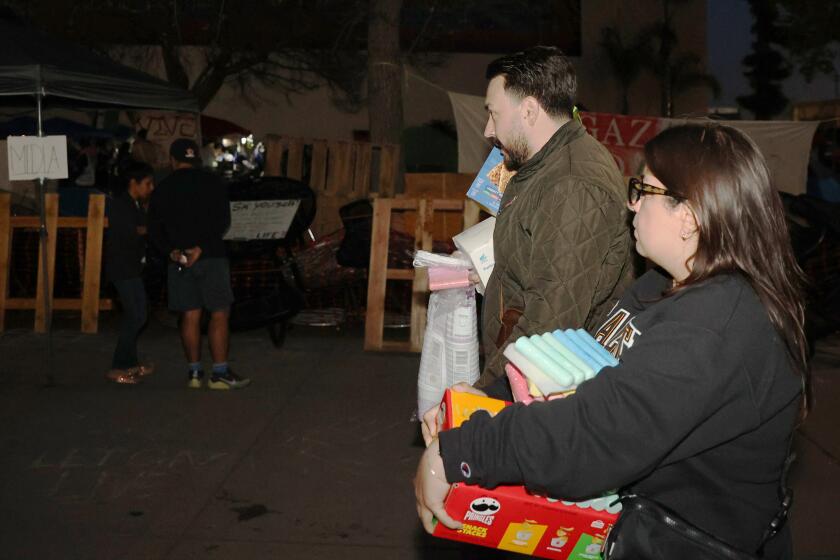When a Parent Suffers From AIDS : Youngsters Grapple With a Deadly Disease in the Family
A week before Christmas, 16-year-old James learned his father had contracted AIDS from a blood transfusion.
Since then, the tall San Gabriel Valley honor student has watched his once-close family disintegrate and his father’s body and mind decay.
“We used to have father-son talks every day after school,” he said. “Now we can start . . . but it ends up in an argument.”
James, who asked that his last name not be used, felt powerless to help his father. Last semester, he reacted, barely passing three of his five classes. He fought with friends and relatives.
He was arrested but will not say why, though he does observe: “I just felt angry and I completely lost control.”
Getting Control Back
James is starting to regain control of his life with help from what may be the nation’s first support group for adolescents whose parents have acquired immune deficiency syndrome or have been exposed to human immunodeficiency virus, HIV, which causes AIDS.
Officials at All Saints AIDS Service Center in Pasadena, sponsored by All Saints Episcopal Church, hope their support program will be a model for others.
“It’s too difficult for these kids to live with it, with no one around to talk to,” said Connie McCleary, the psychologist who leads the support group.
“If you said your father had cancer, friends would rally around you and do everything they could to help you out. But that just doesn’t happen with AIDS.”
Began Meeting in June
About 10 youngsters ages 14 to 19 from across Los Angeles have attended the weekly support group since it began meeting regularly in June. McCleary organized the group after parents with AIDS asked about counseling for their children.
Without the group and individual services at the All Saints AIDS center, James said calmly, “I would have been in jail by now or I would have committed suicide.”
Shelly, an 18-year-old who attends the group with her sister, learned a year ago that her mother is carrying the AIDS virus.
“I felt like I had to grow up real fast so my mom didn’t have to worry about me,” she said. “I’m not afraid of her dying any more.”
Fears Watching Deterioration
She most fears watching her mother suffer with her disease, she said, adding, “I don’t know how I’ll handle that. Seeing her slowly waste away--that seems worse to me.”
National AIDS groups have praised the All Saints program, saying relatives of those with the disease must get help, too, in the next phase of the fight against the disease.
“It’s great that these kids who were being ignored now have somewhere to go,” said Lynn Vance, spokeswoman for the National AIDS Network in Washington. “We ought to see this happening more and more now.”
All Saints’ AIDS center runs nine support groups, including a Spanish-speaking group, for about 100 people. The largest Episcopal Church west of the Mississippi River, All Saints has a reputation for taking on social causes.
An ‘Incredible Trauma’
“What we’re trying to do for these teen-agers is help people who are going through an incredible trauma so it doesn’t (ruin) their lives for good,” said the Rev. Albert Ogle, AIDS center director.
AIDS is difficult even for adults to discuss. Of his peers and his father’s illness, James said: “None of them knows, not even my best friend. Really, the only time I get to talk about it is in the group. It gets it out and it’s helped me straighten out my life.”
All Saints officials in March received a $24,500 grant from the Trinity Episcopal Church in New York for the support group. McCleary, in turn, has pledged to write guidelines for other AIDS organizations to use in their own youth programs.
Besides underwriting the group, the grant lets McCleary offer individual counseling to youngsters too young or too apprehensive to attend weekly sessions. The services are free and can continue as long as needed.
Children React Differently
McCleary has counseled young people, ages 4 to 19, on how AIDS affects a family. Older children quickly try to stop relying on parents; younger children feel helpless because they are so dependent, unable to earn money or be much help to their family.
McCleary tried to organize the youth group in February but only a few youngsters attended regularly. She went further, distributing information to schools and community centers.
Only this summer, however, has the group grown large enough for regular meetings, in part, experts say, because AIDS--once primarily associated with drug users and homosexual men--continues to spread.
The group’s evolution also reflects a growing realization by counselors that there is a need and there are programs to help family members of those with AIDS or who have tested positive for HIV.
The Centers for Disease Control in Atlanta does not keep statistics on how many AIDS patients have children. But experts agree the number is small, though growing.
McCleary, 47, who had a marriage and family counseling practice, has led AIDS-related support groups for about 18 months. Now one of three full-time employees, she became a center volunteer after one of her brothers was diagnosed with AIDS in June, 1986, and another brother died of the disease in August, 1986.
She guides the group’s Monday night meetings but lets discussions roam where participants choose. She prepares dinner, and as she and the teen-agers eat and socialize, they discuss their feelings as much as they do facts about AIDS.
Closer to Her Mother
Shelly said that, if anything, AIDS has brought her closer to her mother, who now tires easily and is often anemic from extensive treatment.
“I hear other kids saying ‘Oh, God, I got in a big fight with my mom again.’ You don’t know how lucky you are to have a mom that can yell at you.”
She said she initially was apprehensive about going to the support group, wondering “What are we going to do, sit around and feel sorry for ourself? I thought I’d be the last person who would be here talking about my dying parent.”
But she has been reassured by knowing she is not alone: “Last week . . . we were talking about how we get mad at our parents and then we get frustrated and then we feel guilty. Guilty because it may hurt something that’s already bad. And everyone knew how that felt.”
Know More Than Parents
Because of more extensive exposure in school and through the media, many teen-agers McCleary counsels know more about AIDS than their parents do. One 19-year-old, McCleary said, first suggested to his mother, “I think dad has AIDS.”
They also know, or learn quickly, that AIDS kills and is spread by intimate sexual contact, through intravenous drug use and, occasionally, through blood transfusions.
James, whose older brother also attends the support group, said he still hugs his father as often as he used to; he sometimes still finishes his dad’s dinner. But their relationship has fallen apart.
“His thinking is not what it used to be,” James said. “He used to be a genius, almost. He was a very reasonable man, but he’s just not the same anymore.”
Family Financially Strapped
His mother, “a wonderful woman,” has had the worst of it, especially now that most of the family money is spent on costly medicine and treatment, he said. The family never was wealthy but “now we’re pretty much barely hanging on.”
James is looking for a job to make money each day after going to summer school, which he is attending to make up for his poor grades.
He was disappointed with his last birthday. His parents tried to make it festive, James said, but it didn’t work.
“You learn to get over things quickly,” he said. “You just go day by day. I try. But I have this thing about looking into the future. And from what I can see it’s not too nice.”
More to Read
Start your day right
Sign up for Essential California for news, features and recommendations from the L.A. Times and beyond in your inbox six days a week.
You may occasionally receive promotional content from the Los Angeles Times.






